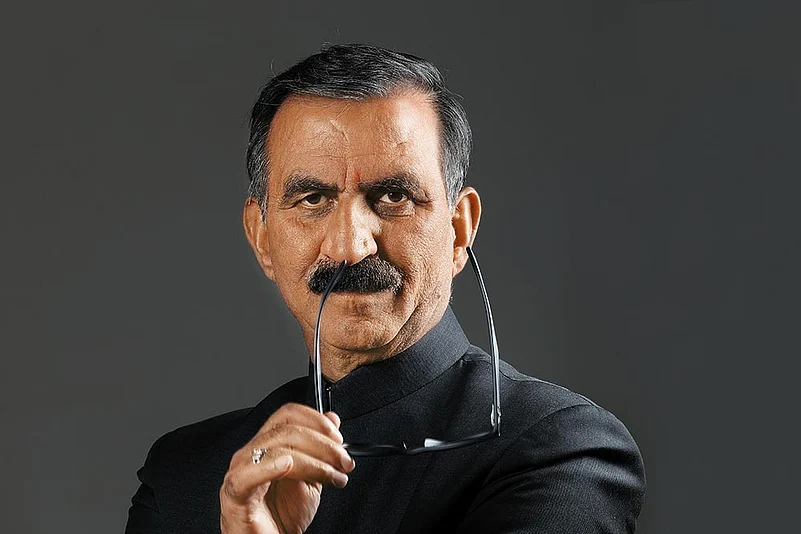In a state that venerates strong leadership, Sukhvinder Singh Sukhu faced a formidable challenge at the beginning of his tenure as the chief minister of Himachal Pradesh. Months after he assumed office, a natural disaster wreaked havoc in the Himalayan region in July this year.
“I was in my constituency when news of the floods in the Kullu region reached me. Around 75,000 tourists were stranded in various parts of the area,” recalls Sukhu. Raised by a father who worked as a bus driver in the state roadways, Sukhu understood the economic significance of tourists and the need for a secure evacuation process to maintain their trust in the state’s administration.
With only 15,000 government vehicles available for evacuating 75,000 tourists and dealing with damaged roads, the situation was dire. The region lacked electricity, water and food due to the floods, requiring assistance from locals during evacuations to the Mandi district. Sukhu led a team of 1,000 members, including key ministers, working tirelessly for 48 hours to manage the crisis.
Leadership Challenge
Sukhu’s political rise in Himachal Pradesh encountered resistance within his party from the late Virbhadra Singh, a six-time chief minister. A government official notes, “It has made Sukhu tough, and he does not accept a ‘no’ from his ministers or bureaucrats.” This determination became evident when the Indian Air Force struggled to rescue approximately 300 tourists stranded in Chandra Taal due to insufficient helicopter-landing infrastructure. Sukhu immediately swung into action. “Two of my ministers ventured into the region with JCBs (earthmoving machines), given the substantial four-to-six feet snowfall. We collaborated closely with the locals. The rescue operation was executed by clearing snow from the roads,” Sukhu recalls.
His adept leadership during the natural disaster received praise from the World Bank. Auguste Tano Kouame, country director for India, commended the chief minister’s “timely measures” in providing relief to flood victims.
Sukhu remains committed to restoring lost homes and infrastructure. “Many people lost their homes, and we have amended compensation rules, now offering Rs 7 lakh per family affected by the floods. We are also providing Rs 7,000 per month in cities and Rs 5,000 per month in rural areas for rental accommodation until their homes are rebuilt,” he says.
Preserving the Mountains
The chief minister acknowledges the recurring threat of annual rains and the escalating impact of climate change on hilly regions and is prepared to tackle the issue through robust policy decisions. “We need to halt the unchecked construction of buildings in areas prone to river overflow during incessant rains. I have instructed the administration to closely monitor construction activities and keep riverbanks free from encroachments,” he asserts.
Sukhu is critical of the vertical cutting of mountains for road construction and calls for adherence to engineering guidelines. “Mountains need to be cut at a 45-degree angle, but they have been cut at a 90-degree angle, causing excessive landslides. We must ensure that future road construction follows proper guidelines,” he says.
Moving With the Times
Sukhu embraces the new-age language of start-ups, entrepreneurship and sustainable development. “We are inviting green industries that align with the nature of the hills. Food processing, data centres and renewable energy are sectors that will help us grow without damaging the fragile natural ecosystem of this beautiful state,” says Sukhu.
Under his leadership, the state has set an ambitious target of becoming a green energy state by 2026, with all its transport fleet running on electric vehicles. To promote the adoption of EVs, it has launched the Rajiv Gandhi Self-Employment scheme, providing 50% subsidy on the purchase of e-taxis, e-buses and e-trucks. To ease the burden on state capital Shimla, he plans to develop other cities in the state, with focus on Kangra as the tourist capital of the state.
Sukhu, a Rahul Gandhi loyalist handpicked to lead the state’s party office during Virbhadra Singh’s dominance in Himachal Congress, envisions making Himachal the richest state in the country within 10 years. Despite potential conflicts with Central public sector units like NTPC, SJVN and NHPC, he is determined to fight for his people’s rights, advocating for a fair share of the profit from power companies. “We are providing the raw material for the production of electricity, i.e., water and land. But what do we get in return? Just a 12.5% share in their profits? The rules were written in the past, and as a new-generation chief minister, I am willing to fight for my people’s rights, who are the real custodians of the land and water of this state. We are fighting for 40% to 50% of the profit share from power companies,” adds Sukhu.
The demand from the Sukhu government in Himachal can impact the stock prices of the public sector units as these companies face the ire of the public and green activists for disturbing the natural ecosystem of the hilly regions. In addition to these challenges, Sukhu has also taken on neighbouring states of Haryana and Punjab, claiming a 7.19% share in the Union territory of Chandigarh under the Punjab Reorganization Act, 1966, along with royalty in Bhakra Beas Management Board projects.
“I am only asking for what is rightfully ours,” asserts Sukhu. Aligned with the central Congress leadership, unlike his predecessor late Virbhadra Singh, Sukhu aims to consolidate his hard-fought leadership within the party and the chief ministership in the state.
Sukhu, a street fighter, is determined to transform politics within his party and the state. In a state that has not re-elected a government for a second consecutive term since 1990, he has his work cut out.






























